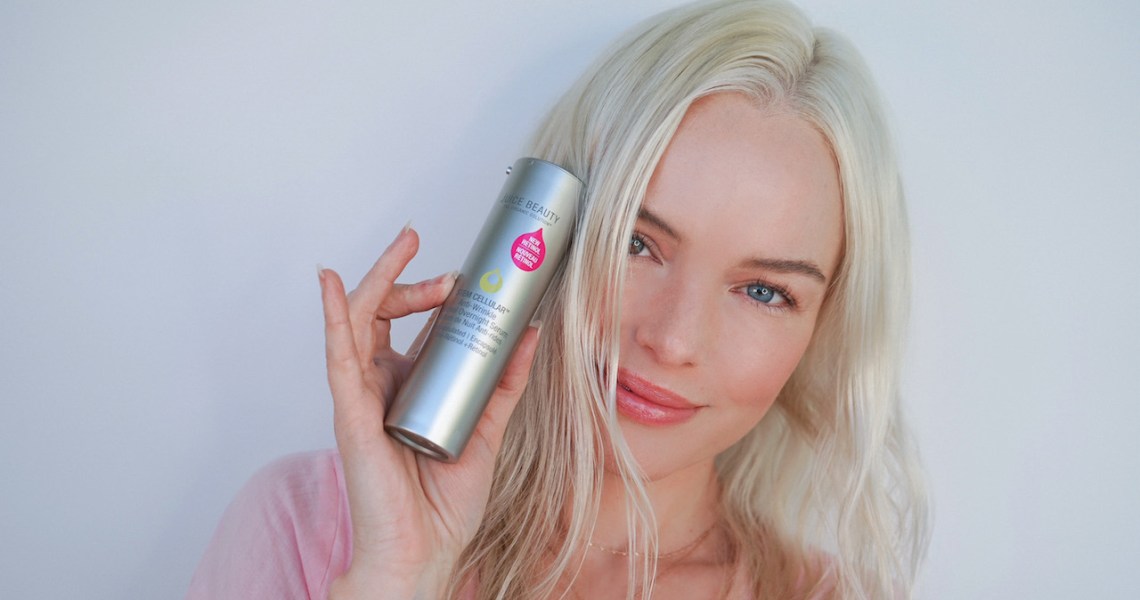One of the first U.S. clean beauty brands, 15-year old Juice Beauty has evolved from a Whole Foods staple to a celebrity favorite.
On January 4, the brand announced on its website and social channels actress Kate Bosworth as the face of its newly launched Stem Cellular Retinol Overnight Serum. Bosworth is the second major celebrity face of the brand; Gwyneth Paltrow served as its creative director of makeup for three years starting in 2017 and remains a shareholder. Juice Beauty also launched Goop’s first private-label skin-care products in 2016.
Celebrities have been key in “raising the profile” of clean beauty, said Juice Beauty founder Karen Behnke, who added that “people like Kate Bosworth are doing it in a great authentic way.” Bosworth is following in the footsteps of Paltrow, having launched her own clean beauty and lifestyle site called KIND.EST in October 2019. Clean beauty has made its way from granola to glamour through lifestyle sites like Goop, which have then fueled larger retail partnerships.

Juice Beauty has been referred to as the “OG” of clean beauty, launching in the pre-Instagram era of 2005. Its first stockists were Whole Foods and Pharamaca. “They were the groups that were interested” in clean beauty at the time, said Behnke.
The brand made major inroads into the mainstream beauty market when it launched at Ulta in 2010. “That was a big deal, because Ulta Beauty is in the suburbs, and 10 years ago, they were heavily concentrated in the Midwest,” said Behnke. She noted that Ulta’s foray into clean beauty with Juice Beauty was a “big leap,” at the time. “Will America embrace the brand made with organic ingredients?” was still an open question, said Behnke. The brand sells through a wide range of retailers including Bloomingdale’s, Sephora Canada and Australia’s Mecca Cosmetics, among others.
Behnke attributes Juice Beauty’s staying power to its reliance on clinical efficacy and “going beyond the word ‘natural,’” said Behnke. The brand’s website has a drop-down menu labeled “clinically validated,” which links to before-and-after photos and clinical study results, allowing it to benefit from the growing popularity of “clean-ical” beauty.
It has also tapped into demand for sustainable beauty. Its new the retinol serum bottle is made from 100% ocean and land waste plastic, and the brand is in the process of converting its other bottles to these materials, as well. Two years ago, it opened a farm in Sonoma County, and it has recently relocated to a new solar-powered corporate headquarters. It spotlights its farm and headquarters on its site and social media, promoting what it calls “farm to face” beauty.
The brand has upped its focus on digital during the pandemic, which “really allowed us to retrench and look at what we need to do more with our brand. Certainly [that includes] more digitally focused campaigns, more social media and more brand ambassadors,” said Behnke. She noted that Ulta, Sephora Canada, and DTC online sales “greatly escalated” for the brand during the pandemic, and it is currently experimenting with Instagram sales.
While expensive celebrity ambassadorships tend to be mainly in the reach of large conglomerate-owned brands, smaller clean beauty brands have benefitted from awareness driven by celebrities. In addition to Paltrow’s links with Juice Beauty, other celebrities helping the rise of clean beauty have included Jessica Alba and Miranda Kerr with their brands The Honest Company and Kora Organics, respectively. In addition, Emma Watson has promoted brands including RMS Beauty and Tata Harper on her “Press Tour” Instagram account.
“Celebrities have always been into our brand because they they called us so much in the beginning,” said Behnke. “We’ve been lucky with that. They were really on the cutting edge.”




